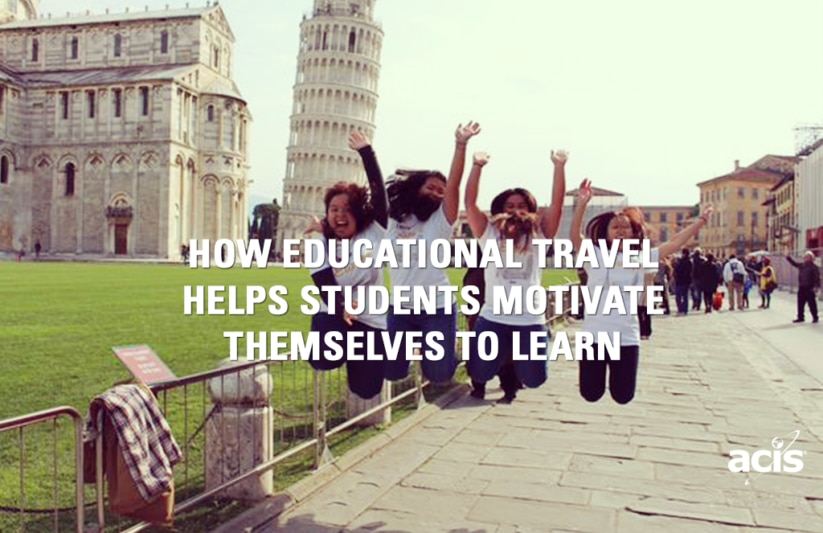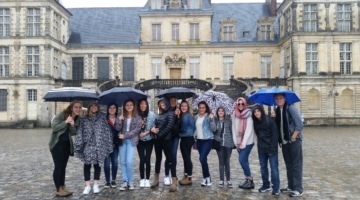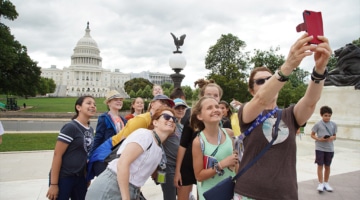How Educational Travel Helps Students Motivate Themselves to Learn

Learning is an active process. Any teacher will surely tell you that students who have a thirst for knowledge have the best chance of succeeding in school and in life. So how can teachers inspire their students to fall in love with learning?
Larry Ferlazzo, an English and Social Studies teacher from Sacramento, CA, sought to answer that question in a blog post he published for Edutopia in March of this year. He highlighted four qualities to encourage students to exhibit to show they’re on the right track: autonomy, competence, relatedness, and relevance.
Autonomy
Extending the classroom to the outside world empowers students to discover and seek out knowledge for themselves. Ferlazzo says that “Providing students with freedom of choice is one strategy for promoting learner autonomy.” He highlights “cognitive choice” or problem-based learning situations as an excellent medium for autonomous learning to occur.
We’ve heard from students countless times over the years how much travel has inspired them to push themselves to learn more and go new places. Melissa Velpel traveled with ACIS in 2011, “I got back from being abroad with ACIS and I knew I had to keep learning because everything I did from the smallest of gestures to the greatest of activities was a learning experience when I wasn’t in my home country. I never want that learning to stop. So I carefully chose a college that I knew had a good anthropology department and opportunities to travel abroad. I’ve since finished a year at college and I know I made the right choice, because not only has my past travel shaped me into a capable young woman able to tackle college without batting an eye, but it has also opened up a million thrilling different opportunities for me.”
Competence
Making students believe they’re capable of learning can be more than half the battle. Ferlazzo cites researchers like Carol Dweck who point out the power of positive feedback to inspire a growth mindset in students. Paying special attention to students’ ability to challenge themselves and step outside their comfort zone pays dividends according to Dweck’s research. She encourages educators to praise students for their work ethic instead of their intelligence.
Traveling abroad gives students an incredible opportunity to prove to themselves exactly how capable they really are. Sarito Chandler, a Spanish Teacher from Newtown, CT, describes the growth she observed in her students while traveling, “One of the many joys of traveling to Spain with students is the daily opportunities to share their enthusiasm and excitement as they try to express themselves in Spanish. Watching their confidence grow, when they realize and say, ‘I did it. I spoke in Spanish and they understood me!’ is always one of the many highlights of our trips.”
Relatedness
It’s hard to learn from someone you don’t like. It’s plainly that simple. The best teachers have a rapport with their students that makes them want to earn their teachers’ respect by succeeding in their class. Rita Pierson gave an inspiring TED Talk where she recounted a revealing story, “I once heard a colleague say, ‘They don’t pay me to like the kids.’ To which I said, ‘Kids don’t learn from people they don’t like.'”
Few things will strengthen a relationship between a teacher and their students more than planning, organizing and taking a trip abroad together. Long-time ACIS Group Leader Michelle Shupp shared a message she received from a parent. Her relationship with their daughter had a huge impact on her life, “Learning in the classroom is so dependent upon relationships. I think that you gave my daughter a passion for learning that I didn’t see before. She had a great senior year after the trip, which set her up for success in college.”
Relevance
In order to forge a connection between what students learn and how they might apply it throughout their lives, Ferlazzo encourages students to write about how they see what they’re learning as relevant to their lives. Educational travel not only provides students the chance to learn experientially, but it also provides them with fantastic motivation in advance of their trip. Knowing they’ll be in the middle of a foreign country surrounded by native speakers pushes students to be prepared when they arrive.
Ari Marzban traveled to France with ACIS in 2007. He described how the experience helped him grow and learn, “Visiting France was a very important event in my life: it helped affirm my appreciation for different cultures and paved the way to more international experiences. One of my most cherished memories there was ordering slices of ham to make a sandwich in the gardens of Versailles; I felt so confident in my ability to exercise my language skills.” Ari went on to study abroad in Shanghai, China for a year as a university student, and he credited his first trip abroad with giving him the inspiration to travel to new places for the rest of his life.
Once a fire is lit in a young mind, it can burn for years to come. The best teachers see the untapped potential in their students and inspire them to fulfill their dreams. As John Dewey put it, “Education is not preparation for life; education is life itself.”










